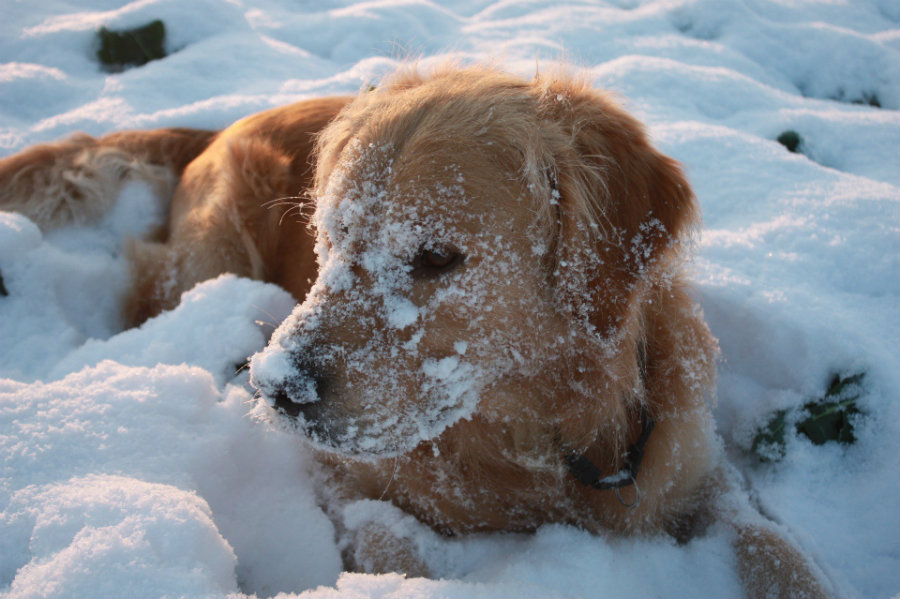Animals are vulnerable to low temperatures and all kinds of food that we humans loved to eat during the Holidays. Thus, pets need extra cares during this season to avoid a trip to the vet’s emergency room. Although some animals can handle cold better than us, they still need to be protected from it, especially from the chemicals that are often used to get rid of ice.
Animals expert warned that freezing temperatures could affect pets and other animals, putting their lives at risk. The American Veterinary Association says pets need to be inside during winter and farm animals must receive extra cares to protect them from the extreme weather.

All animals must have access to water at all times -not snow- and have larger rations of food because they eat more during winter to create fat to keep themselves warm. Owners must provide proper shelter and make sure water bowls are not frozen.
Animals also need a thick bedding to avoid losing their natural warm to the floor, pets and farm animals included. Avoid space heaters and heat lamps due to the risk of burns and fires. Heated pet mats should also be avoided because they can cause burns if unattended.
Dogs and cats should stay inside to avoid frostbite and hypothermia, even when people think their dog or cat has enough hair to keep itself warm outdoors. Dogs still need their walk and owners cannot postpone them due to the weather or holiday parties.
Walks should be short, and owners have to be extra careful with arthritic and elderly pets, since they have a difficult time walking on snow and ice and can slip or fall, hurting themselves. Small dogs are more vulnerable to the cold because their bodies are closer to the snow or ice on the floor. All dogs can suffer frosting, especially in their paws, ears, and tip of tails.
Owners should get special booties and coats during winter walks to protect them from the extreme temperatures. It is important always to carry an extra piece of pet clothing to keep pets dry at all times.
After every walk, pets’ paws should be checked because cold temperatures may cause them to crack or bleed. Ice accumulation between animals’ toes or an injury can cause sudden lameness.
If the pet of the house is shivering, whining, seems anxious, slow or stops moving and starts looking for warm places, they are suffering from hypothermia. After detecting the symptoms, keep the animal warm and call the vet. Frostbites are harder to detect. It could pass a few days until owners realize the injury. People should consult their veterinarian in that case as well.

Walking your dog during winter can expose it to deathly chemicals
When walking a dog during winter, they get in contact with snow, ice, and chemicals that are used to avoid frozen streets, sidewalks, and car liquids. They are vulnerable to get in contact with chemicals like antifreeze or different types of salt used to melt ice.
The worst of all the wintertime chemical spills is antifreeze because it can kill pets. Antifreeze often leaks from car’s radiators and cats and dogs love how it taste. Accidental antifreeze spillage must be clean up, and pets should be kept away from the garage. Intoxicated dogs and cats might start acting “drunk” or begin to convulse. If people notice any of these symptoms, take the animal to the vet immediately.
During winter, different types of salt such as calcium or sodium chloride is used to melt ice and snow and keep it from refreezing. Those elements are dangerous to pets’ paws and can make them bleed or crack.
After every walk, owners have to wipe down or wash pets’ feet, legs and belly to remove any chemical on their hair. This action reduces the risk of dogs and cats getting poisoned by licking their paws and fur.

Decoration and foods you should keep away from your pets during the Holidays
Some plants can be dangerous to cats and dogs. Avoid mistletoe and holly around the house. Holly can cause nausea, vomiting, and diarrhea while mistletoe can cause stomach trouble and cardiovascular problems. Owners should buy plastic imitations, and if they insist on having the real plant, they must keep them out of reach of their pets.
The Christmas tree must be stabilized. It is annoying for people when their cats or dogs mess with the tree, but for pets, it could mean a trip to the ER or death because it can seriously injure them. Anchor the tree by using two separated weights next to the tree or hook the top of the tree to the ceiling.
Also, people should keep away tinsel from cats and dogs. It can block the animal’s intestine and lead to painful surgery.
When having visitors, warned them that pets cannot eat chocolate, cafe and other caffeinated foods and drinks and explain them it can cause pets stomach problems, abnormal heart rhythms. Grapes and raisins are also dangerous, and it can cause kidney failure. Turkey bones should also be avoided since they can make dogs and cats choke.
Guest must keep an eye on their drinks and the medication they bring to a house with pets because they are curious animals and can drink or swallow pills if they are unattended. Alcohol can cause dogs and cats to become weak and can lead to respiratory failure, coma, and even death. Depending on the drug, the pet will suffer different symptoms. If an owner suspects his/her pet ate any medication, take the animal to the veterinarian.
Source: The American Society for the Prevention of Cruelty to Animals
